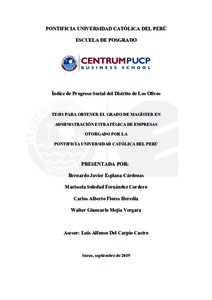| dc.contributor.advisor | D’Alessio Ipinza, Fernando Antonio | |
| dc.contributor.author | Esplana Cárdenas, Bernardo Javier | |
| dc.contributor.author | Fernández Cordero, Marissela Soledad | |
| dc.contributor.author | Flores Heredia, Carlos Alberto | |
| dc.contributor.author | Mejía Vergara, Walter Giancarlo | |
| dc.date.accessioned | 2020-02-12T21:23:04Z | |
| dc.date.available | 2020-02-12T21:23:04Z | |
| dc.date.created | 2019-09 | |
| dc.date.issued | 2020-02-12 | es_ES |
| dc.identifier.uri | http://hdl.handle.net/20.500.12404/15898 | |
| dc.description.abstract | La presente investigación tiene como propósito principal calcular el Índice de
Progreso Social (IPS) para el distrito de Los Olivos. La metodología de la investigación se en
basó en el Social Progress Imperative (SPI), la cual permite determinar el Índice de Progreso
Social mediante la integración de cuatro componentes en tres dimensiones: (a) Necesidades
humanas básicas, (b) Fundamentos de bienestar, y (c) Oportunidades. El tipo de investigación
es de tipo cuantitativa, no experimental y con alcance descriptivo, en donde la información
base, se obtuvo de una recolección de datos primaria a través de encuestas realizadas a una
muestra de la población del distrito, por medio de un cuestionario de preguntas
proporcionados por CENTRUM PUCP Graduate Business School, además se recolecto la
información a través de fuentes secundarias.
El tamaño de la muestra con los cuales se obtuvieron los resultados fue de 400 jefes
del hogar, a los cuales se les entrevisto teniendo en cuenta las cuatro zonas del distrito. El
cálculo del IPS del distrito de Los Olivos es el primer precedente con el que cuenta el distrito
y podrá ser utilizado para la toma estratégicas de decisiones en el ámbito social y ambiental.
El resultado obtenido del IPS del distrito de Los Olivos es de 67.48, clasificado en el nivel
“Medio Alto”, cabe destacar que se encuentra por encima del IPS de Lima Metropolitana.
Los resultados a nivel de dimensiones posicionan a Necesidades humanas básicas en
primer lugar con un puntaje de 75.13 clasificado como “Alto”, seguido de Oportunidades con
un puntaje de 64.97 clasificado como “Medio Bajo”, y Fundamentos de bienestar con un
puntaje de 62.35 clasificado como “Medio Bajo”. La investigación muestra objetivamente
que los resultados a nivel de indicadores que componen el IPS en el distrito de Los Olivos
necesitan atención y sirve como punto de partida para que las autoridades municipales
consideren este trabajo de investigación como fuente para su gestión. | es_ES |
| dc.description.abstract | The purpose of this research paper is to calculate the Social Progress Index (IPS) of
the district of Los Olivos in order to ascertain the results in the dimensions that the model
poses. To achieve this, we have followed the methodology proposed by the Social Progress
Imperative (SPI) and the information was gathered through surveys provided by CENTRUM
PUCP which were taken to the family heads of each home of the district. Additionally, a
quantitative research was included containing a descriptive analysis in the district. In the
same way, it contains information proceeding from secondary sources.
This study is the first made without precedents in the district of Los Olivos to measure
the IPS and may be used to take strategic decisions. The IPS is centered in offering detailed
information of the population through the following measurements: (a) basic human needs (b)
welfare foundations, (c) opportunities. The results obtained from the IPS of the district of Los
Olivos is 67.48, which represents a “Medium High” classification level which is higher than
the IPS of Lima. This indicator was obtained from the average of the results of the three
measurements: (a) basic human needs with a score of 75.13 classified as “High”, (b) welfare
foundations with a score of 62.35 classified as “Medium Low” and, (c) opportunities with a
score of 64.97 classified as “Medium Low”. This shows that the components of welfare
focused in the basic human needs are well established in comparison with the other
measurements.
This research shows in an objective manner the indicators that the district of Los
Olivos needs to improve: it likewise serves as a starting point that will enable the municipal
authorities to take decisions and actions in order to improve their social and environmental
indicators in such a way that they can likewise improve the quality of life and opportunities
of the population that lives in the district of Los Olivos. | es_ES |
| dc.language.iso | spa | es_ES |
| dc.publisher | Pontificia Universidad Católica del Perú | es_ES |
| dc.rights | info:eu-repo/semantics/openAccess | es_ES |
| dc.rights.uri | http://creativecommons.org/licenses/by-nc-nd/2.5/pe/ | * |
| dc.subject | Indicadores sociales--Perú--Los Olivos (Lima : Distrito) | es_ES |
| dc.subject | Indicadores económicos--Perú--Los Olivos (Lima : Distrito) | es_ES |
| dc.subject | Investigación cuantitativa | es_ES |
| dc.title | Indice de progreso social del distrito de Los Olivos | es_ES |
| dc.type | info:eu-repo/semantics/masterThesis | es_ES |
| thesis.degree.name | Maestro en Administración Estratégica de Empresas | es_ES |
| thesis.degree.level | Maestría | es_ES |
| thesis.degree.grantor | Pontificia Universidad Católica del Perú. CENTRUM | es_ES |
| thesis.degree.discipline | Administración Estratégica de Empresas | es_ES |
| renati.advisor.dni | 41319855 | |
| renati.advisor.orcid | https://orcid.org/0000-0002-4242-1220 | es_ES |
| renati.author.dni | 43133725 | |
| renati.author.dni | 40777354 | |
| renati.author.dni | 25857849 | |
| renati.author.dni | 44574180 | |
| renati.discipline | 413307 | es_ES |
| renati.level | https://purl.org/pe-repo/renati/level#maestro | es_ES |
| renati.type | https://purl.org/pe-repo/renati/type#tesis | es_ES |
| dc.publisher.country | PE | es_ES |
| dc.subject.ocde | https://purl.org/pe-repo/ocde/ford#5.02.04 | es_ES |






